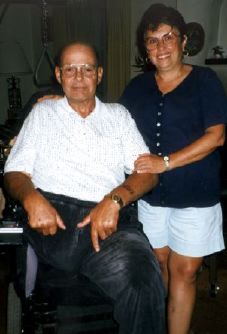 Medical
Marijuana
Medical
Marijuana
 Medical
Marijuana
Medical
Marijuana Where is the compassion?
 Norm
and Pat Major
Norm
and Pat Major
Chronic pain and cancer patient
convicted felons on probation
charged with marijuana cultivation
convicted felons on probation
charged with marijuana cultivation
Photo: Norm and Pat were forced to plead guilty to a felony and pay a $23,500 fine to save their family home from forfeiture.
Norm and Pat Major have three children and eight grandchildren. Norm is a former member of the board of governors at the Elks Club. Pat spends time working at the Altar Society at St. Peters Catholic Church. Because he "wanted a life," Norm and Pat Major have now become felons in Oregon, where state law does not distinguish between medical and non-medical marijuana use.
Back in 1966, an industrial accident in which a scaffolding fell on Norm's lower back caused recurring tumors to occur in his back. Two years later, as a result of painful complications, he was forced to undergo a hind quarter amputation, sacrificing a leg and half of his pelvis.
This was just the beginning of their long ordeal. In 1972, the cancer spread to a lung, which was removed. Recurring cancers, including a brain tumor, led to repeated surgeries. Medical records show Norm had more than 80 surgeries, including two to cut nerves to reduce pain. He built up tolerance for legally prescribed pain-killers. At one time, he required 600 milligram doses of morphine every three to four hours.
"I couldn't get out of bed because I was so drugged. I was more dead than alive. I took tons of stuff just to go to sleep." Addicted to legal drugs, Norm developed the temperamental behavior and physical symptoms typical of users of opiate-based street drugs. "I was a druggie. It was a nightmare." Pat agrees, "I had no life, either. It was all driven by Norman and the drugs."
Thirteen years ago, several doctors recommended that he try marijuana. The decision to do so was very difficult for the couple, requiring a lot of praying and crying, but they tried it and it worked. Marijuana made Norm's muscles relax which relieved the pain.
After a few months, Norm got off all of his prescription drugs. In the following years, he resumed his life, able to pursue hobbies such as refinishing furniture. To avoid the criminal market, the couple grew 36 cannabis plants in an indoor garden in their basement until an informant reported them to the police, leading to a raid and subsequent conviction.
"You have these people, who are otherwise pillars of their community, who were sentenced because he wanted a life," said defense attorney Rich Mullen.
POW Gallery
